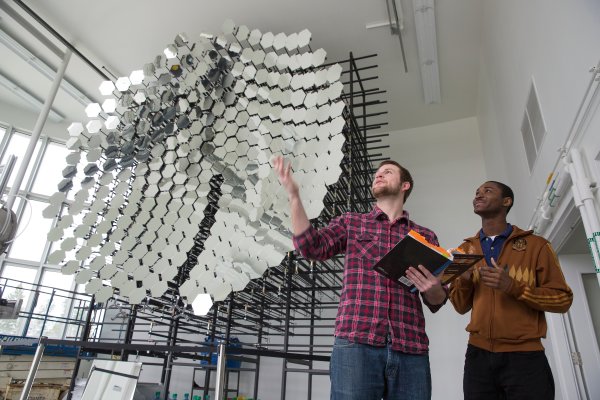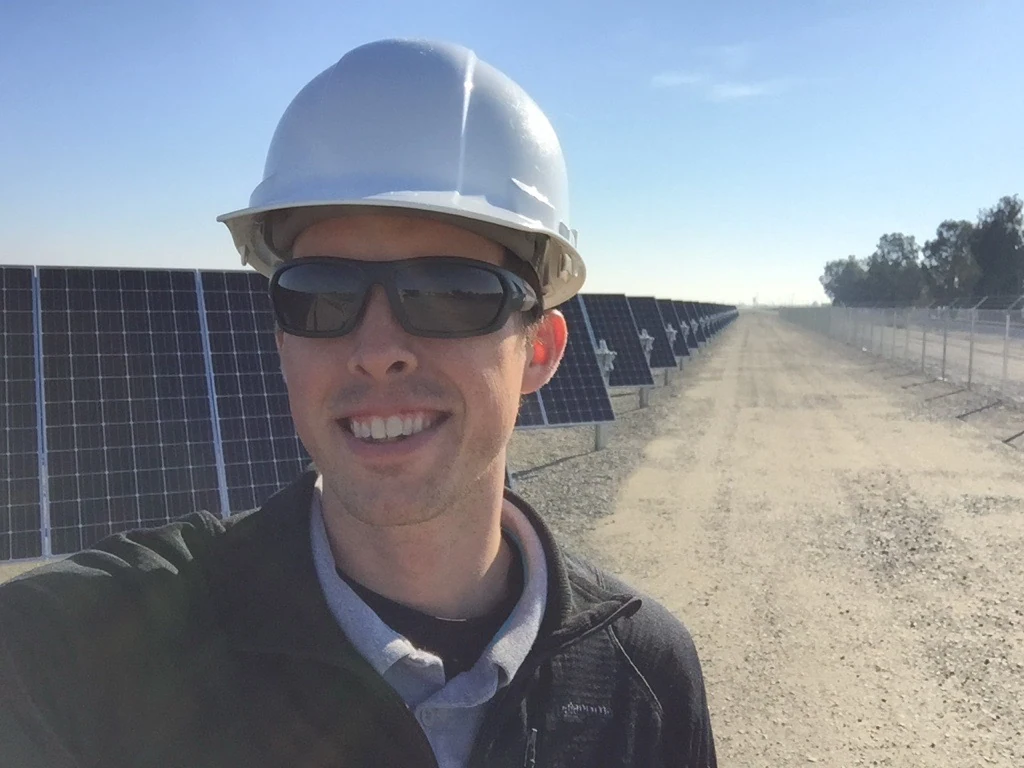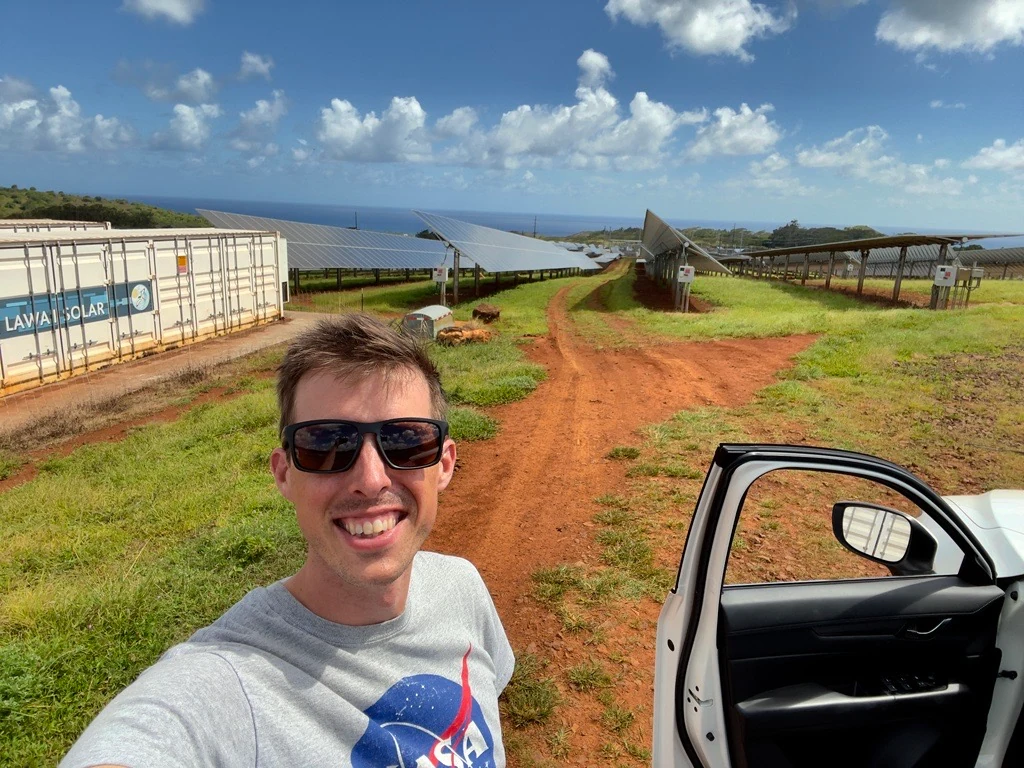In the Business of Sustainability
James Nagel ’10, a Valparaiso University alumnus, majored in mechanical engineering with a minor in business administration, and he is now using his understanding of technology and business to support sustainable energy technology. He is the co-founder of HelioVolta — which performs analysis, assessments and support for solar energy projects — and SolarGrade, a software organization within HelioVolta that provides field workers with the tools to maximize efficiency and communication. Out of 140 competing organizations, his company won the U.S. Department of Energy’s Software Innovation Prize in 2022 in the renewable space, and was later awarded a Small Business Innovation Research Grant from the same department.
Before any of that, however, James was a student in Bronxville, New York with some close ties to Northwest Indiana.
“My parents met at Valpo, my grandfather was the dean of the Chapel for a while, so it was a big nudge from the family,” James says. “Having a school with a Lutheran identity was pretty important to me, and one where you could get an engineering education in four years and still have a liberal arts experience as well really fit well for me. As I look at folks from schools that didn’t have that aspect, it’s clear that it’s a pretty different outcome.”
As a child who loved expressing his creativity through building things, James was certain that he wanted to be an engineering major, starting in the civil engineering program as a freshman. The Fundamentals of Engineering course, which is required for all freshmen, gave him the perspective needed to realize where his real interests lay, and he switched to mechanical engineering. He also picked up a minor in business administration to round out his skill set.
Some of his most important experiences came from outside the classroom. In the summer of 2009, he interned at NASA’s Armstrong Flight Research Center, assisting with the engineering and coding of large drones. It also gave him a firsthand look at how a Valpo education ranked among the most well-known in the nation.
“My co-interns came from MIT and Stanford, those kinds of schools,” James says. “When you’re in that context, you really see the caliber of Valpo. You are on-par with some of the world-renowned engineering schools.”
James also participated in Engineers Without Borders, visiting Kenya, Tanzania, Haiti and Nicaragua and putting his classroom learning into practice in ways that made a tangible impact on the communities he worked in.
“It really helped turn the classroom learning into practical applications in a way that had consequences,” James says. “It wasn’t just working in a lab and building out a robot where it’s a cool project, but going to more remote regions of the world and building water systems, or working on power systems. You see that direct impact in the local communities, and it really grounds out your work and holds you accountable for what your work is producing.”
In addition to taking his learning outside the classroom to impact the world, James’ Valpo experience had a deep impact on his internal understanding of himself.
“The idea of vocation comes to mind,” James says. “Leaning into an identity and having a faith foundation and an understanding of how that can express itself in a lot of different ways. I think Valpo was able to contextualize the learning in that way, such that it becomes part of your identity that you can lean into moving forward.”
After graduation, James spent a year and a half working as a mechanic in Holden Village, a year-round Lutheran Christian retreat center in Washington state. As an engineer in a self-sufficient, off-grid settlement, James was on-hand to tackle a slew of unique problems and challenges.
”That really helped underscore those classroom lessons, putting them into practice and learning how things can go wrong in the real world, and how you troubleshoot those in an effective way.”
James then took a job with Electricity De France in San Diego on the solar energy team for a few years, taking a leave of absence to hike the Pacific Crest Trail as a fundraiser for Holden Village. After that, he was part of the launch of Clean Energy Associates’ U.S. based-team. During this portion of his career, the flexibility James learned at Valpo was paramount to success.
“It was helpful that Valpo gave the foundation, particularly with mechanical engineers, that you learn everything. I was able to jump in and grow the electrical side of things,” James says.
During his time with Clean Energy Associates, James was involved in root cause analysis, identifying operational issues, and the representation of plaintiffs in lawsuits related to their systems, as well as the corrective actions thereafter. Finally, James had accumulated the skills and experience to found HelioVolta. Today, the company is involved with examining operational design issues in solar energy technologies, creating in-depth reports on industry thought leadership.
Another branch of the business called SolarGrade uses software to connect businesses with their on-site team, providing a richer exchange of information than what raw numbers can convey regarding the health of a project.
“We liken it to buying a car and looking only at the odometer,” James says. “You should look at the service record and the maintenance that’s been performed. Has it been in an accident? Has it caught fire before? It gives you a better view. It’s why some have called us the CarFax of solar.”
While HelioVolta and SolarGrade have seen notable success, starting a business — especially one on the cutting-edge of renewable energy technology — was no easy task.
“The hardest thing is that you’re jumping off on your own, and there’s no playbook for it. There are books you can read, but there’s no guide,” James says. “If there was, everyone would do it and there wouldn’t be that risk.”
Throughout his varied experiences, one thing James learned from Valpo that has stuck with him is the ability to communicate and work effectively with people of varied backgrounds.
“Engineers are in the same space as teachers and pre-med students,” he says. “You foster the ability to communicate outside of a very technical framework. I think Valpo is unique in that way; you have people from all these different communities and you’re put into a larger campus community, where you need to interact and have good conversations.”
For students today in the College of Engineering who are looking to get the most out of their experience, James encourages them to really take advantage of the expertise and opportunities that their college years can provide.
“Get to know your professors. They have a lot of information beyond homework assignments and what’s in the classroom. Really take advantage of summer internships. You’re learning a bunch of stuff in the classroom, and you get a chance to see what it looks like in practice.”
To learn more about Valpo engineers putting their knowledge into practice, read about the spring service trip to Nicaragua to install solar panels here. To find out more about the exciting ways Valpo is pushing renewable energy, click here.


